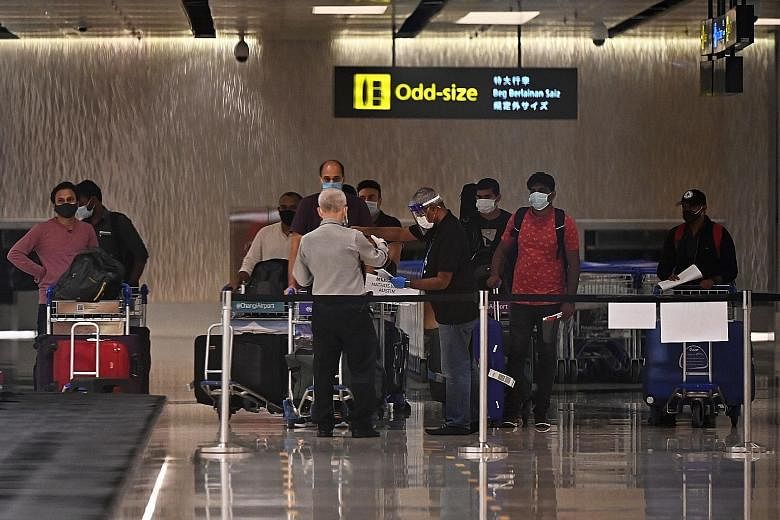Following a streak of more than 10 days without Covid-19 cases here in the community and the positive updates on vaccine development, it seemed like the planned restart of leisure travel yesterday would be the latest step in returning to life before the pandemic.
But the air travel bubble between Singapore and Hong Kong set to take off yesterday was grounded at the last minute.
On Saturday evening, Transport Minister Ong Ye Kung said Hong Kong and Singapore agreed that the arrangement would be delayed, given the evolving Covid-19 situation in Hong Kong.
"I can fully understand the disappointment and frustration of travellers who have planned their trips," he said.
"But we think it is better to defer from a public health standpoint."
The air travel bubble - the Republic's first to allow two-way travel without quarantine since border restrictions were imposed amid the Covid-19 pandemic - was slated to launch with one flight into each city and each flight with a maximum capacity of 200 passengers.
Under the agreed terms, travel will be suspended for two weeks if the seven-day moving average of the daily number of unlinked Covid-19 cases is more than five in either Singapore or Hong Kong. A two-day notice period will apply before the travel bubble is suspended.
But while Hong Kong's new unlinked cases reported on Saturday took the rolling seven-day average to 3.86, which was below the trigger point, the decision was still made to trigger it.
The Hong Kong authorities said yesterday that the epidemic situation in the city is "worsening rapidly", and there is evidence of many silent transmission chains in the community.
Independent aviation analyst Brendan Sobie from Sobie Aviation said the postponing of the travel bubble was a sensible one, given the rising number of Covid-19 cases in Hong Kong.
-
Current travel arrangements
Singapore has sought to open its borders to more forms of travel in recent months, but has also had to adjust the measures in response to the escalating Covid-19 situation. Here is a look at the measures:
1. AIR TRAVEL BUBBLES
• Hong Kong: Singapore's first two-way air travel bubble. People will be able to travel between the two places without the need to be quarantined, subject to conditions including testing negative for Covid-19 more than once.
• Was to be launched in both directions yesterday, but was postponed because of the rise in Covid-19 cases in Hong Kong.
2. UNILATERAL OPENING OF BORDERS
• Open to travellers from Brunei, New Zealand, Vietnam, Australia and mainland China.
• Unilateral openings are a standing invitation from Singapore to these countries, which are deemed to have successfully controlled the spread of Covid-19.
• Allows for all forms of short-term travel, including leisure travel.
• Visitors have to take a swab test on arrival, and can go about their activities after they test negative. They have to use the TraceTogether app.
3. BILATERAL GREEN LANE ARRANGEMENTS
These allow for essential business or official travel between both countries. China was the first country to establish a green lane with Singapore.
• Japan: The Business Track allows for resumption of cross-border travel and business exchanges, with necessary public health safeguards such as testing before travellers leave and after they arrive, and adhering to a controlled itinerary for the first 14 days.
• China: A green lane is established with six provinces and municipalities: Shanghai, Tianjin, Chongqing, Guangdong, Jiangsu and Zhejiang.
• Malaysia: Singapore has two schemes with its neighbour. The Reciprocal Green Lane facilitates cross-border travel for essential business and official purposes. The Periodic Commuting Arrangement allows Singapore and Malaysia residents with long-term immigration passes for business and work purposes in the other country to periodically return home for short-term home leave.
• South Korea, Brunei, Indonesia and Germany: Conditions for travel similar to those with the other countries, such as pre-departure and post-arrival testing, and a controlled itinerary for the first 14 days.
"It was likely a suspension would be triggered within the first few days, which would make it difficult as passengers not able to return immediately would have to come back on non-bubble flights, resulting in quarantine," he said.
"In addition, given the high risk of the bubble being suspended after a couple of days, the initial flights would have experienced several last-minute cancellations."
Aviation analyst Shukor Yusof from Endau Analytics said there was always the danger that the travel bubble would not take off, given the surge of cases in many countries. "Very few countries are like Singapore, and fewer still have the ability and discipline to control the virus," he said.
Last week, the Republic imposed stricter restrictions on travellers coming in from Malaysia and Japan, following the rising number of cases in the two countries. It also announced earlier this month that all travellers from higher-risk countries will be required to take a polymerase chain reaction test within 72 hours before departing for Singapore.
Worldwide, the number of Covid-19 cases continues to increase at a rapid pace. Reuters reported that infections are still rising in 69 countries. There have been at least 58.1 million cases and about 1.38 million reported deaths so far.
With the pandemic showing no signs of slowing down, experts and government officials worldwide have repeatedly warned that air travel is unlikely to resume at scale any time soon.
Mr Shukor said those itching to travel will have to remain patient.
"In my view, the health measures needed to undertake any journey are not worth the agony unless absolutely necessary," he said.
But encouragingly for travellers and the aviation industry, the setback on the launch date of the air travel bubble has not dealt a fatal blow to the idea of restarting leisure travel in a safe manner.
In announcing the suspension of the arrangement with Hong Kong, Mr Ong said: "This is a sober reminder that the Covid-19 virus is still with us, and even as we fight to regain our normal lives, the journey will be full of ups and downs.
"But we will press on and look forward to when we can safely launch the air travel bubble."
Mr Aaron Wong, 32, founder of frequent flyer website Milelion, who was due to fly out on the first air travel bubble flight to Hong Kong yesterday, said that travellers need to accept that getting to go overseas is a bonus.
"Travel can resume before a vaccine is found, but it will have to be tightly controlled and will be subject to start-stop spurts like what we're seeing with Hong Kong," he said.
"I think most travellers accept that this is part and parcel of the situation we're in now, so I don't think it will dampen demand for future travel bubbles at all."
Mr Sobie said the suspension of the air travel bubble should give travellers more confidence that the air travel bubble concept - and its flexibility to adapt to changing conditions - works, and should not be seen as a setback.
"While now is not the time for the Hong Kong-Singapore air travel bubble, the framework is in place to launch a bubble - be it with Hong Kong or other potential partners - when conditions improve."


